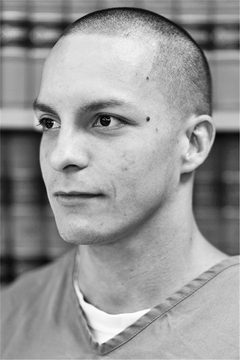|
Getting your Trinity Audio player ready...
|

Exchange for Change, a non-profit organization that teaches writing courses in state prisons, federal prisons and juvenile detention centers recently named their new Prison Poet Laureate, Christopher Malec.
Malec took over the position in January. He’ll hold it for two years because communications with prisoners is difficult.
“The duties of the prison poet laureate would do what other laureates do, write poems for special occasions,” says Kathie Klarreich, executive director of Exchange for Change.
The Poet Laureate can also choose to showcase the writings of other poets as well. One of the perks of the job is to have his poetry published, although he will receive NO compensation from the book.
“O Miami (Poetry Festival) will be producing a chapbook that we will make available to the public,” she says. “Hopefully it is a vehicle for us to talk about the incarcerated writer.”
Klarreich say the new Poet Laureate is a master of the spoken word.
“He talks about issues that are important to him,” she says.
His work is “meaty, substantive and address important issues.”
Klarreich believes this is probably the first Prison Poet Laureate program in the country.
“We hope it will serve as a model so other states will do the same thing,” she says.
The organization’s mission is to provide communication and writing skills for the incarcerated population.
“And to bring the voice of the incarcerated to the public,” she says.
Another goal is to educate the public about who the incarcerated area.
“Because they are us,” she says. “We tend to think because they go to prisons, they’re not like us. The more we can confront our own prejudices and biases, the more they have a chance of succeeding when they come out.”
The public often doesn’t realize the inequities of the prison system.
“You can have a life sentence, without having killed someone. We have some of the harshest sentencing laws in the country,” she says. “We have people who were incarcerated at a young age.”
Because Florida is a state without a parole system, even if a prisoner rehabilitates, there is no option to get out of prison once you are given a life sentence.
The Poet Laureate program helps bring the prisoner’s voices to the outside. Inmates are basically inaccessible. In fact, she hasn’t been able to reach the current Poet Laureate in months. Klarreich says the program helps acknowledge the talent of the inmates and humanizes the prison writers.
“It helps them tell their story,” she says. We don’t condemn or condone the reason why our students are in prison. We don’t go in to fix anybody. We go in to educate. Education is a human right and should not be taken away just because someone is incarcerated.”
The program targets people who have their GED. Klarreich says the only thing the state is held accountable for is that they have to provide inmates the ability to earn their GED.
“We decided to offer something not available, courses for people who already had their GED,” she says. “So their intellectual curiosity wouldn’t die.”
The program is called the Luis Angel Hernandez Prison Poet Laureate. It was named after an inmate in her original class of students in 2014 who passed away in 2019.
“He had just gotten his GED. He was so excited and proud, curious and motivated,” she says.
Exchange for Change teachers used to go into the prisons to teach, but the pandemic forced them to switch to online instruction.





